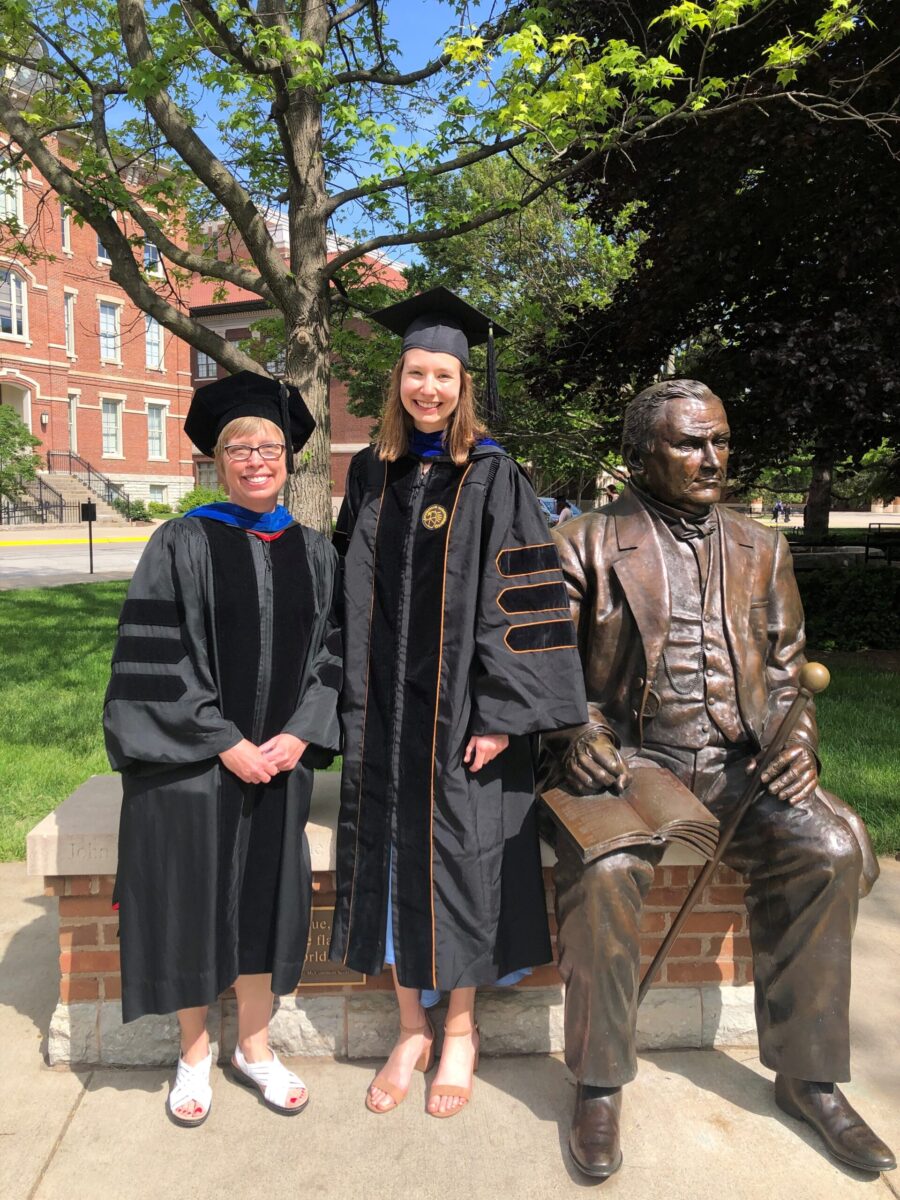HHS fosters culture of mentorship for graduate students through people-centric focus
Written By: Rebecca Hoffa, rhoffa@purdue.edu

Kim Buhman (left) poses for a photo with former PhD student Alyssa Zembroski (right) on her graduation day.Photo provided
The shelves in Professor Kim Buhman’s office in Stone Hall are lined with photo after photo of her former graduate students, showcasing them at some of their proudest moments: graduation, their thesis defense and other milestones in the Purdue University Department of Nutrition Science. Her students’ accomplishments in their careers and lives are some of Buhman’s favorite things about being a faculty mentor in the College of Health and Human Sciences (HHS).
“The best thing is when they come to me and tell me that they got a job at the very end,” Buhman said. “But along the way, there are other times where they have successes, and those are great days too. That’s my favorite thing about mentoring is getting to share their successes and be a part of that.”
In alignment with the HHS Strategic Roadmap initiative to enrich the residential experience, the College of Health and Human Sciences has increased its focus in recent years on fostering strong mentorship relationships for both graduate students and faculty members. Jason Harris, associate dean for graduate programs and online education and associate professor of health sciences, has led these efforts.
“Nationally, there has been a lot of emphasis on mentoring, so we have tried to not only develop our own tools but also use tools that others have developed to provide to our faculty and our students,” Harris said. “Ultimately, mentoring really needs to be something that becomes part of our culture. It’s not this one-off thing or additional thing that we do, it’s something that should be embedded in everything that we do.”
While Harris has built from resources offered by the Graduate School and other universities, it has been a priority to supplement these resources with those that are specific to the needs of HHS faculty and students. In doing so, Harris has been working on developing an online mentorship toolkit that outlines expectations for mentors and mentees, offers communication strategies and provides handbooks of best practices.
In addition to these resources, the college has cultivated a variety of seminars and lectures focused specifically on mentorship for graduate students. The HHS Graduate Student Council was also formed to act as a voice for graduate students in the college, and it is currently working to develop a survey that will allow the council and Harris to better understand graduate student experiences within their mentor/mentee relationships and offer support accordingly.
“I think overall our college has done well, just given the nature of our disciplines, which are more people-centric,” Harris said. “I think that lends itself to us to have better relationships between each other — there’s just that nurturing aspect among our faculty. The reception has been good with rolling out these resources.”
Harris noted that although it’s often important to have multiple mentors who reflect the various aspects of life where support is needed, there are certain traits that apply across all exceptional faculty mentors: empathy, open communication, flexibility, understanding, and a willingness to learn and change.
Commended for demonstrating all of these qualities, Buhman was awarded the 2022 HHS Outstanding Graduate Faculty Mentor Award as well as the university-wide Provost’s Outstanding Graduate Faculty Mentor Award in the spring for her exceptional mentorship skills.
“It was really an honor that the faculty in my department would nominate me for an award like that,” Buhman said. “And then to think that I was selected for the college and the whole university level — there are so many great mentors at Purdue, and our graduate students are really lucky.”
Alyssa Zembroski, a 2021 PhD graduate of the Department of Nutrition Science and former mentee of Buhman’s, attended the reception in May that honored Buhman for her outstanding mentorship.
“I had a great graduate experience, and I attribute a lot of it to Dr. Buhman, just the way that she guided me through that whole process,” Zembroski said.
For Zembroski, it wasn’t just Buhman’s guidance that made her a remarkable mentor but also her infectious enthusiasm for her work, her encouragement toward developing communication skills and her emphasis on balance across all aspects of life.
“She was interested in my life outside of school and would always ask for updates,” Zembroski said. “She genuinely cares.”
Ultimately, Harris’ goal is to continue to build up resources that help foster healthy mentor/mentee relationships throughout the college.
“The success of faculty and students really comes down to having a positive relationship and having these conversations about expectations,” Harris said.
Just as Buhman fondly reflects on the graduate mentees she’s had throughout the years, she noted that many of her own mentors’ actions and words have stuck with her in the same way, shaping her mentorship strategies.
“There are just some mentors that stay with you for the long haul,” Buhman said. “They become part of your professional family.”
Discover more from News | College of Health and Human Sciences
Subscribe to get the latest posts sent to your email.